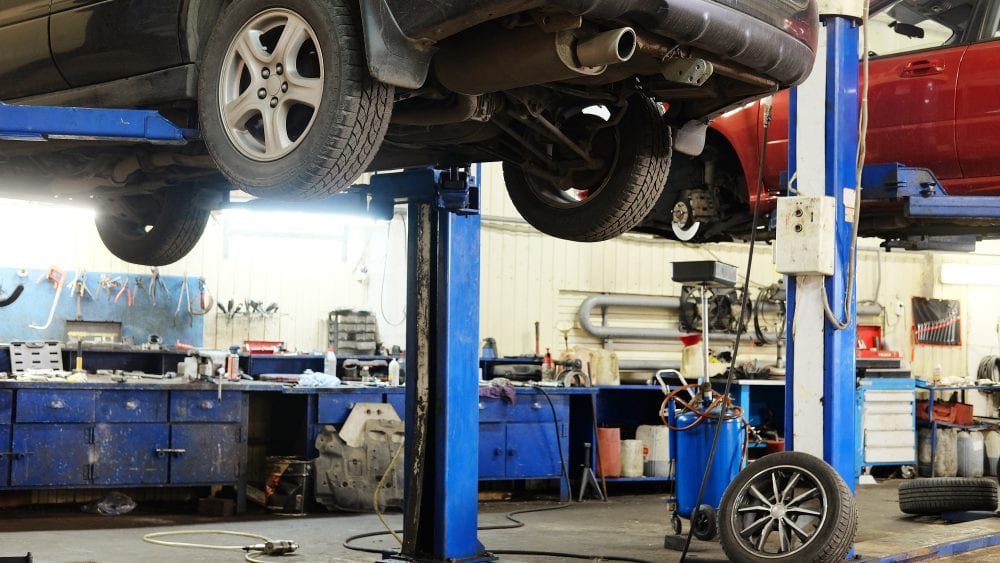Chemicals in auto repair shops are tools of the trade, necessary as any other. In the course of a day, garages will utilize solvents such as brake cleaner, carburetor cleaner, gasket remover, and parts cleaner. Lubricants are essential and include motor oil, transmission fluid, gear oil, and grease. Many substances are flammable – gasoline, starting fluid, acetylene, and propane to name a few. Auto body shops in particular handle highly volatile paints, varnishes, lacquers, and thinners.
Even though these substances are daily hazards, safe operations are necessary and attainable.
Identify
The first step in any risk-management plan is identification. What are the risks? When considering this for auto repair garages, define risk in a broad sense. Consider potential to cause damage to:
- human health
- property (buildings, contents, vehicles in your care)
- the environment (pollution)
For example, a few rags just used to wipe up a small gasoline spill may not represent a high hazard to health, and it certainly does not represent a large pollution risk. However, it can quickly become a fire hazard if near a vehicle having a tailpipe welded.
Storage
Store hazardous materials properly. Read through and familiarize yourself with the safety data sheets (SDS) of each chemical. But don’t stop there. Plain, common sense is an excellent risk reducer.
- Store in a well-ventilated, well-lit area.
- Control who has access to the materials, and when their use is warranted.
- Utilize proper storage equipment, such as fire cabinets and metal drums.
- Maintain safeguards, including spill containment systems.
- Guard personal protective equipment by storing it separately from the materials for which they provide protection. For example, store respirators separately from solvents.
- Be familiar with which materials are incompatible. Maintain separate storage areas if necessary.
- The vapors of certain chemicals are harmful. Many solvents in particular produce harmful or corrosive vapors.
- Store chemicals only in their original, sealed containers and with their original labels intact. Do not switch containers unless necessary.
- Keep an emergency spill kit near the storage areas. For certain substances, spill kits can be as simple as water, sand, or absorbent pillows.
Transportation
When transporting hazardous materials, plan for an accident. Write down cleanup procedures. After an accident is no time to figure out the proper course of action. Ensure all materials are safely secured so that no spills occur on rough roads or even during a mild accident.
- Store chemicals in their original containers and secure them so they cannot slide, tip, or fall.
- Maintain a record of the chemicals you are transporting. If a leak occurs in an accident, being able to identify the escaped chemical can greatly reduce cleanup costs.
- Bring the appropriate personal protective equipment for handling purposes.
- Keep an emergency spill kit in the vehicle.
Disposal
Disposing of hazardous substances properly is the garage’s responsibility and should be performed with understanding and caution. While some empty containers can simply be rinsed and thrown away, others must be handled in a specific manner. In addition, disposal of unused product must be considered. Collection points maintained by many local municipalities for hazardous substances are usually only open for households, not businesses. Read through the SDS and the manufacturer’s label, as disposal procedures are often explained there. Many waste management companies maintain separate services for the disposal of hazardous wastes. Contact local disposal authorities with questions.
The following resources on this topic are particularly helpful:
- Best Management Practices For Automotive Repair Shops (EPA)
- Managing Your Hazardous Waste (EPA)
- Hazardous Waste Reduction checklist and Guidebook (EPA)
- Managing Automotive Repair and Body Shop Wastes A fantastic document containing many common Do’s and Don’ts of storage and disposal.
Bankers Insurance specializes in insuring auto repair garages and can provide safety manuals and materials to bolster your safety program. Our risk management services can help you discover and address common safety hazards. Let us help your garage create an accident-prevention mindset. Check out our garage insurance page for more information or to obtain an insurance quote for your shop.
Was this post helpful?
- Share it using the links below
- Review all our business insurance posts
- Join our newsletter




Comments are closed.